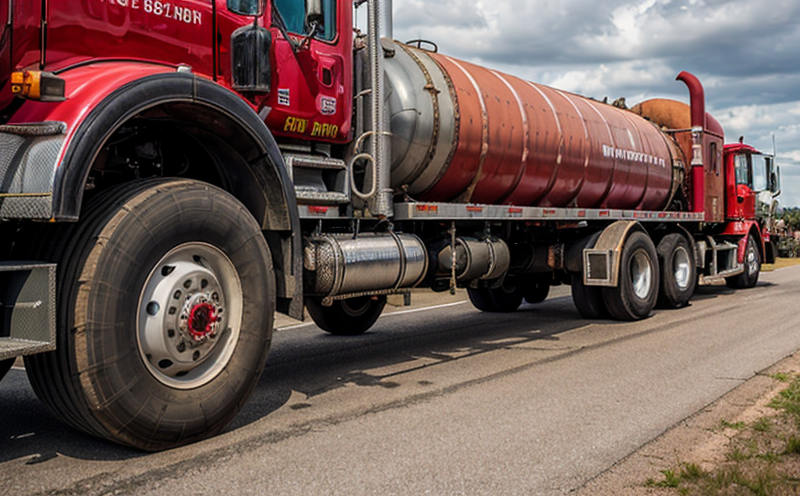Fuel tanker truck inspection
The inspection of fuel tanker trucks is a critical component in ensuring safety and compliance within the transportation and logistics sector. Fuel tankers are responsible for transporting large volumes of fuel, including gasoline, diesel, and other hazardous materials, across various terrains and climates. The integrity of these vehicles directly impacts public safety, environmental protection, and regulatory adherence.
Our inspection service is designed to meet both national and international standards such as ISO 9001:2015 for quality management systems, ISO 45001:2018 for occupational health and safety, and the European Standard EN 14374-1 & -2 for fuel tankers. We ensure that each inspection is thorough, accurate, and conducted by highly trained personnel using state-of-the-art equipment.
The process begins with a comprehensive pre-inspection checklist which includes verifying the vehicle’s documentation, such as manufacturer specifications, maintenance logs, and operational records. This ensures all necessary details are accounted for before any testing commences. Following this, we conduct visual inspections to check for physical damage or corrosion on both external and internal parts of the tanker.
For internal inspections, our team utilizes sophisticated tools like ultrasonic thickness gauges to measure wall thicknesses accurately, ensuring no compromises in structural integrity. We also employ non-destructive testing methods such as radiographic examination (RT) or magnetic particle inspection (MPI), depending on the suspected material flaws or anomalies.
Fluid sampling and analysis are crucial steps where we collect samples from various sections of the tanker for laboratory evaluation. These tests help identify potential contamination issues, assess fuel quality, and ensure compliance with specific grade requirements set by regulatory bodies like ASTM D4813-20a for diesel fuels or ISO 5925:2017 for gasoline.
The final phase involves creating detailed reports summarizing all findings along with recommendations for necessary repairs or maintenance actions. These reports serve as valuable resources not only for immediate corrective measures but also for long-term planning and improvement initiatives within fleets.
By adhering strictly to industry best practices, our fuel tanker truck inspection service provides peace of mind to operators by reducing risks associated with accidents involving hazardous materials transportation while simultaneously supporting sustainability goals through efficient resource utilization. Our expertise ensures compliance with all relevant regulations, enhancing overall safety standards in the transportation sector.
Benefits
- Ensures compliance with international standards like ISO 9001:2015, EN 14374-1 & -2, ASTM D4813-20a, and ISO 5925:2017.
- Reduces risks associated with accidents involving hazardous materials transportation by identifying and rectifying potential issues early.
- Supports sustainability goals through efficient resource utilization and reduced waste due to leak prevention measures.
Environmental and Sustainability Contributions
The inspection of fuel tanker trucks plays a pivotal role in promoting environmental stewardship by minimizing the risk of spills or leaks which can lead to severe ecological damage. By ensuring that these vehicles operate safely and efficiently, we contribute significantly towards reducing carbon footprints associated with transportation activities.
Additionally, our services promote recycling initiatives by facilitating timely repairs needed to extend the lifecycle of fuel tankers without compromising performance standards. This approach supports broader sustainability goals aimed at conserving resources while enhancing operational excellence across fleets.
Use Cases and Application Examples
In practice, our fuel tanker truck inspection service caters to various stakeholders within the transportation and logistics sector including fleet managers, drivers, maintenance teams, and regulatory authorities. For instance:
- Fleet Managers: Ensure consistent adherence to safety protocols across all vehicles in their fleet.
- Drivers: Receive timely notifications about required maintenance or repairs before they become critical issues affecting operational continuity.
- Maintenance Teams: Get precise data points needed for targeted interventions that extend the useful life of tankers.
- Regulatory Authorities: Gain confidence in knowing that all vehicles meet stringent safety and environmental criteria set forth by governing bodies.
Our comprehensive approach ensures that every aspect related to fuel tanker truck inspections is addressed comprehensively, contributing towards safer operations while supporting sustainable practices throughout the industry.





